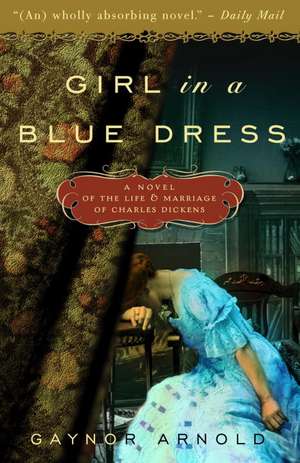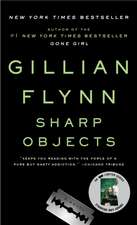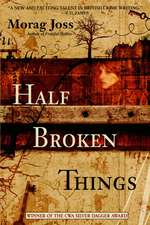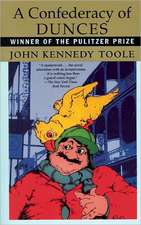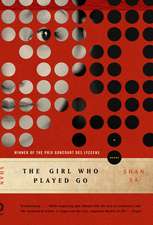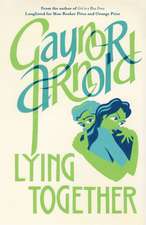Girl in a Blue Dress: A Novel Inspired by the Life and Marriage of Charles Dickens
Autor Gaynor Arnolden Limba Engleză Paperback – 31 iul 2010
The story opens on the day of Alfred’s funeral. Dorothea is not among the throngs in attendance when The One and Only is laid to rest. Her mourning must take place within the walls of her modest apartment, a parting gift from Alfred as he ushered her out of their shared home and his life more than a decade earlier. Even her own children, save her outspoken daughter Kitty, are not there to offer her comfort–they were poisoned against her when Alfred publicly declared her an unfit wife and mother. Though she refuses to don the proper mourning attire, Dodo cannot bring herself to demonize her late husband, something that comes all too easily to Kitty.
Instead, she reflects on their time together–their clandestine and passionate courtship, when he was a force of nature and she a willing follower; and the salad days of their marriage, before too many children sapped her vitality and his interest. She uncovers the frighteningly hypnotic power of the celebrity author she married. Now liberated from his hold on her, Dodo finds the courage to face her adult children, the sister who betrayed her, and the charming actress who claimed her husband’s love and left her heart aching.
A sweeping tale of love and loss that was long-listed for both the Man Booker Prize and the Orange Prize, Girl in a Blue Dress is both an intimate peek at the woman who was behind one of literature’s most esteemed men and a fascinating rumination on marriage that will resonate across centuries.
From the Hardcover edition.
Preț: 115.65 lei
Nou
Puncte Express: 173
Preț estimativ în valută:
22.13€ • 24.03$ • 18.59£
22.13€ • 24.03$ • 18.59£
Carte disponibilă
Livrare economică 01-15 aprilie
Preluare comenzi: 021 569.72.76
Specificații
ISBN-13: 9780307463029
ISBN-10: 0307463028
Pagini: 422
Dimensiuni: 135 x 202 x 24 mm
Greutate: 0.32 kg
Editura: Three Rivers Press (CA)
ISBN-10: 0307463028
Pagini: 422
Dimensiuni: 135 x 202 x 24 mm
Greutate: 0.32 kg
Editura: Three Rivers Press (CA)
Notă biografică
Gaynor Arnold was born and brought up in Cardiff, Wales. She read English at St. Hilda's College, Oxford, where she acted in many plays, notably at the Edinburgh Festival and in a tour of the U.S. She has two grown children and lives in Birmingham. Girl in a Blue Dress is her first novel.
Extras
1
My husband’s funeral is today. And I’m sitting here alone in my upstairs room while half of London follows him to his grave.
I should be angry, I suppose. Kitty was angry enough for both of us, marching about the room in a demented fashion. They couldn’t stop you, she kept saying. They wouldn’t dare turn you away—not his own widow. And of course she was right; if I’d made an appearance, they would have been forced to acknowledge me, to grit their teeth and make the best of it. But I really couldn’t have borne to parade myself in front of them, to sit in a
black dress in a black carriage listening to the sound of muffled hooves and the agonized weeping of thousands. And most of all, I couldn’t have borne to see Alfred boxed up in that dreadful fashion. Even today, I cannot believe that he will never again make a comical face, or laugh immoderately at some joke, or racket about in his old facetious way.
All morning I have waited, sitting at the piano in my brightest frock, playing “The Sailors’ Hornpipe” over and over again. The tears keep welling from my eyes every time I try to sing the words. But I carry on pounding the keys, and in the end my fingers ache almost as much as my heart.
At last, the doorbell rings, and in seconds Kitty is in the room. She has an immense black veil, a heavy train running for yards behind her, and jet beads glittering all over. “Oh, you should have been there, Mama!” she cries, almost knocking Gyp from my lap with the force of her embrace. “It’s completely insupportable that you were not!”
I pat whatever part of her I can feel beneath the heavy folds of crepe and bombazine. I try to calm her, though now she is here—so strung up and full of grief, so pregnant with desire to tell me all—I am far from being calm myself. My heart jitters and jumps like a mad thing. I dread to hear what she has to say, but I know of old that she will not be stopped. She is near to stifling me, too; her arms are tight, her veil is across my mouth. “Please, Kitty,” I gasp, “You will suffocate us both! Sit down and gather yourself a little.”
But she does not sit down. On the contrary, she stands up, starts to wrench off her gloves. “Sit down, Mama? How can I sit down after all I have been through? Oh, he might almost have done it on purpose!”
“On purpose? Who? Your father?” I look at her with amazement. What can she mean? What can Alfred possibly have done now? What mayhem could he possibly have caused from beyond the grave? Yet at the same time, my heart quickens with dismay. Alfred always hated funerals, and would not be averse to undermining his own in some preposterous way.
“Oh, Mama!” She throws her mangled gloves on the table. “As if it’s not enough that we ’ve had to share every scrap of him with his Public for all these years, but no, they had to be center stage even today, as if it were their father—or their husband—who had been taken from them!” She lifts her veil, revealing reddened eyes and cheeks puffed with weeping.
So it is only his Public she inveighs against; nothing more sinister.
“Oh, Kitty,” I say. “It is hard, I know, but you must allow his readers their hour of grief.”
“Must I? Really, Mama, must I?” She takes out her handkerchief. It is silk with a black lace border and I cannot help thinking that she must have outspent her housekeeping with all this ostentation. She dabs at her eyes as violently as if she would poke them out. “You’d have expected, wouldn’t you, that after giving them every ounce of his blood every day of his existence, at least they’d let him have some peace and dignity at the end?”
“And didn’t they?” My blood runs cold; all kinds of grotesquerie fill my mind. “For Heaven’s sake, child, what did they do?”
“They were like lunatics, Mama.” She takes an angry turn
around the curio table, nearly knocking it over.
“Lunatics?” Surely that cannot be the case. Even the most cynical of his critics would not have begrudged him a decent funeral. “Do you mean there was no respect?”
She pauses, shrugs reluctantly. “Well, I suppose there was at first. When I looked out of the drawing room window, I even thought how patient they’d all been: men, women, and children standing six foot deep, even though it had been raining for hours. Everyone still and silent, save for the sound of the carriage wheels, and the shufflings and sighings and doffings of hats. But the moment we turned away from the park, some desperate wretch ran out and started pulling at the heads of the horses, crying, ‘No! No! Don’t leave us!’ And then it was as if a dam had burst, and the crowd was a great surge of water, flowing everywhere. It was terrifying, Mama! The horses were rearing, feathers floating in the air. I thought we’d be turned over and trampled to death. Trampled by his very own Public at his very own funeral—how fitting that would have been!” She glares around the room, as if daring the furniture to disagree with her.
So that is all; simply some overexuberance of the crowd. But she is not used to it, of course; she never had to run the gauntlet of the riotous masses in America all those years ago, when I’d had to cling to Alfred’s arm as he cleaved through them, smiling as if it were nothing in the world to be pulled about by strangers who thought you belonged to them, body and soul.“Poor Kitty,” I say. “How dreadful for you! And yet your most fervent wish is that I had been
there to witness it all.”
She looks a little chastened. “But it was your right, Mama,” she says, sniffing loudly. “You should have insisted. It is a matter of principle. You should not have allowed Sissy and the others to win again.”
As always, she sees life as a battle. But I am no longer interested in winning or losing, especially with my proud and pretty sister. It’s all too far in the past, and none of Kitty’s ridiculous raging will make one iota of difference now. I look at her sumptuous frock, her extravagant train, her acres of beading, and her very fine, long veil; only the mud around her hem spoils the theatrical effect. “But your clothes seem undamaged, Kitty. Surely the excitement of the Public cannot have been so very bad?”
“You think I exaggerate?” she exclaims, casting herself into the fireside chair. “Well, you can ask Michael. He was in the carriage with Alfie and me. If he ’d not kept hold of the door handle, we ’d have been pitched out on the road! And if I hadn’t clung to the curtains, I’d have cracked my head against the windows or been knocked to the floor! There was such a monstrous surging ahead of us that I would not have put it past them to have laid hands on the coffin itself.” She wipes her nose defiantly. “He would really have belonged to his blessed Public then!”
I am distressed at her ordeal, but there is something in me that wants to laugh, too. I see Alfred in my mind’s eye, throwing back his head and roaring with mirth, but poor Kitty sees only the disrespect. “I’m sure they did not intend to frighten you, Kitty,” I say. “They were simply expressing their grief.”
“Grief? Well, it was a strange kind, then! It seemed more—oh, I don’t know—as if they were some kind of savages and he were some sort of god! In Piccadilly they actually pelted the carriages with flowers; at the corner of Pall Mall they chanted his name and pressed his books to their hearts as if they were holy icons. Ladies fainted and had to be carried away by the dozen. Gentlemen lost hats and gloves—and even boots.” She shakes her head vehemently.
I smile to myself: urchins and pickpockets must have had a fine time.
“I don’t know how they had the gall—taking it upon themselves to wail and sob as if they were widows—when his real widow wasn’t even there!” She leans forward and sets about the fire, wielding the long poker as if she would stab the coals to death. She is all anger; but I can see that she has clearly relished the drama of the day. Why else is she so sumptuously decked out in all the finery of sorrow, the elaborate mourning she knows he hated so much?
“It doesn’t matter,” I say, taking the poker away from her. “The funeral was not for my benefit; it was for theirs. And you saw how much they loved him.”
She turns on me. “Only because they didn’t know him. So many times I wanted to push down the carriage window and shout out to them that he was a cruel, cruel man. Cruel to his wife, and cruel to his children! And yet you sit here so calm and docile! Aren’t you angry at the way he used you? Don’t you want to howl up to Heaven at the unfairness of it all?” She looks as though she will lift up her own head and howl, but instead she gets up and paces a path between the fireplace and the door, her train catching around the chair legs and the sofa ends as she turns and turns about.
I knew she would taunt me with complacency; it is her constant theme. Yet, God knows, I have been angry, and jealous, and sorry for myself. But such emotions only feed on themselves. It is not Alfred’s fault that things happened the way they did. “I will not speak ill of him,” I say. “And I trust you will not either. Especially today.”
“Well,” she says tartly, “I cannot promise that. After all, it’s such a relief to be free from him. I may find it impossible to hold myself back.”
“What do you mean—free?”
“Don’t pretend you don’t know what I mean! Don’t say you don’t feel it, too—knowing we shan’t have to bow to his opinion on every blessed thing! Doesn’t it fill you with a wonderful sense of liberty?” She spreads her arms in a theatrical gesture, the beads along her bodice shivering in unison.
I cannot endure hearing her say those things, even though I know she doesn’t mean them. “What nonsense!” I say. “Your father was a wonderful man—one of the most wonderful men that ever lived—and you know it.”
“Oh, yes, I know it. We all know it. We couldn’t get away from the One and Only, Yours Truly, the Great Original.”
She may speak sneeringly, but I feel the tears starting to my eyes as I hear those famous sobriquets and see his laughing face come before me again. I must keep steady, though; the poor child has had a wretched time. She ’s cold and muddy, and I need to see to her. I push the tea tray forward. “Have some tea to warm up, dearest. Have a little cake, too. Wilson went for it this morning; it’s very fresh.”
She hesitates; she is always tempted by food. She takes off her bonnet and veil, wipes her nose on the silk handkerchief, and pours herself some tea. Then she settles herself snugly on her favorite footstool by my chair. After a while, when the fire has warmed her, she speaks again. She is more composed now: “Every one of the shops closed early, you know. They had black curtains up too, in so many places. And the blinds drawn all along the route. Every man I saw had an armband.” She reaches to take a slice of cake.
“You see, he was a Great Man, Kitty. You should be proud of him.”
She doesn’t answer. But I know she is proud of him. Kitty was by far his favorite child. She munches away at the cake. “So, Mama, what will you do now?”
“Do? What do you mean?” I am horrified. I have always hated change, and this past week has brought me change enough. I cannot think that more would suit me.
“Well, I trust you won’t stay cooped up in this dingy set of rooms anymore. It hardly becomes the widow of such a Great Man.”
“And what do you suggest I do instead? Move in with you and Augustus?”
She stops eating, flushes red. “Well, of course you may. You are always welcome. But that’s not what I meant . . .”
No, it was unfair of me to say that. She thinks I am unaware of how Augustus treats her. Out all day and sometimes far into the night. She wouldn’t want me to witness his neglect at first hand.
“I simply meant that you are more independent, now. You don’t have to think about whether His Greatness would approve of what you do. All this”—she flings her arms around like a veritable Indian goddess—“was what he wanted; what he thought fit. Every blessed chair, every cushion, every plate and cup and cake stand! Now you can do anything you choose. You could take a cottage in the country. Return to Chiswick, perhaps? The air would be better for you. And I could still come and visit.”
“I find the air quite well enough where I am, thank you, Kitty.” I glance around at the red plush curtains, the easy, old- fashioned chairs, the Turkish rug, the walnut piano; and I appreciate for the thousandth time how he had such a tremendous instinct for other people’s comfort. I falter, however, as I catch sight of my music on the piano. The page is open still at “The Sailors’ Hornpipe” and I feel his arm, so firm around my waist, as he propels me around my parents’ parlor at breakneck speed. “I think I shall never move from here,” I tell her. “I like it, and I’m used to it. And on the contrary, it makes me happy to know that he chose ‘every chair and cushion and cake stand’ himself.”
“He gave you all the old things he didn’t want anymore,” she retorts. “Why don’t you admit the Truth for once?”
“The Truth?” I look her in the eye and sigh. “You mean, of course, that I should agree with you?”
“Not necessarily.” She tosses her head and the slivers of jet at her ears do a macabre dance. “But now he’s no longer here, you don’t need to be loyal. You can admit it all now, surely.”
“Admit what, Kitty dear?” We have been over this so many times.
“Oh, Mama! Admit that he never gave you anything but heartache. And children, of course,” she adds sarcastically.
I won’t have that. “If I have had heartache in my life—and God knows I have—your father was not to blame for it. He gave me everything I have valued. If blame there is, well, it is the fault of circumstance.”
Kitty glares. “Circumstance? Oh, of course,” she says, starting to pleat her handkerchief with angry movements of her fine, active fingers. “The One and Only cannot be wrong. Yours Truly remains forever above reproach.”
She means to provoke me; but I know her of old, and will not be drawn. “You may pretend to think ill of him, Kitty, but he has always shown a proper regard for me: I have these comfortable lodgings in a nice part of town, with Mrs. Wilson to look after me—and Gyp, too, to keep me company.” Gyp barks as if he acknowledges the memory. He is old and fat, as I am, but still affectionate. I laugh and tickle his nose.
Kitty won’t have it. “He gives you a wretched apartment in a wretched area of town. With one servant, and no carriage—and a dog with a foul temper. A fine arrangement!” She springs up from the little stool, but she forgets the weight of the train she is wearing and staggers a little against the fireguard, making the fire irons crash into the grate.
I want to smile—but I have to hide it. Kitty can’t abide being laughed at, any more than a cat. “Mrs. Wilson cooks and cleans for me,” I say. “I need nothing more.”
“But you never venture out. You’re like a hermit. Or a ghost of the past, wandering around the room in the dark. Expecting him to ‘turn up,’ perhaps?” Kitty brushes the coal dust from her skirt and turns to pour more tea.
“I’m not at all like a hermit. I see you. I see O’Rourke.”
“Michael? Oh, but he ’s so thin, and old, and unexciting! He was like a skelington in a suit today. You might have thought he was the corpse himself got out of the coffin!”
“Kitty! How can you say such a thing?” (But I can’t help thinking that Kitty is, as always, wickedly apt.) “If it were not for Michael, I don’t know what I would have done these ten years.”
“Don’t you? I cannot imagine what he ’s done for you, other than be two- faced about the whole affair!”
“ Two- faced?” I am a little angry with her now. “Why do you persist in saying that? He ’s been my advocate with your father on every little matter: the rent, the bills, the laundry—”
She rolls her eyes.
“And he’s always been most faithful with the books. He gets me every new edition straight from the press.”
“Does he, though?” She looks at me dully, as if it is no great matter.
“Yes,” I say stoutly. “I think I’m the first person in London to lay eyes on them.” I cast a glance at the dark red line of Alfred’s novels in the bookcase across the room, some of them so battered that they are about to fall apart. “I still read a chapter every day, you know, Kitty. And when I finish each book, I start another. And when I finish them all, I start at the beginning again. When I read, I can hear your father talking to me exactly as if he were in the room; when he used to rush into the parlor, pen in hand: What do you think of this, Dodo? Does this make you laugh? ”
“Or cry, more likely.” Kitty stands by the fireguard, punishing it with her boot.
“Indeed,” I say. “He was a master of every emotion. I knew that from the very first day we met.”
From the Hardcover edition.
My husband’s funeral is today. And I’m sitting here alone in my upstairs room while half of London follows him to his grave.
I should be angry, I suppose. Kitty was angry enough for both of us, marching about the room in a demented fashion. They couldn’t stop you, she kept saying. They wouldn’t dare turn you away—not his own widow. And of course she was right; if I’d made an appearance, they would have been forced to acknowledge me, to grit their teeth and make the best of it. But I really couldn’t have borne to parade myself in front of them, to sit in a
black dress in a black carriage listening to the sound of muffled hooves and the agonized weeping of thousands. And most of all, I couldn’t have borne to see Alfred boxed up in that dreadful fashion. Even today, I cannot believe that he will never again make a comical face, or laugh immoderately at some joke, or racket about in his old facetious way.
All morning I have waited, sitting at the piano in my brightest frock, playing “The Sailors’ Hornpipe” over and over again. The tears keep welling from my eyes every time I try to sing the words. But I carry on pounding the keys, and in the end my fingers ache almost as much as my heart.
At last, the doorbell rings, and in seconds Kitty is in the room. She has an immense black veil, a heavy train running for yards behind her, and jet beads glittering all over. “Oh, you should have been there, Mama!” she cries, almost knocking Gyp from my lap with the force of her embrace. “It’s completely insupportable that you were not!”
I pat whatever part of her I can feel beneath the heavy folds of crepe and bombazine. I try to calm her, though now she is here—so strung up and full of grief, so pregnant with desire to tell me all—I am far from being calm myself. My heart jitters and jumps like a mad thing. I dread to hear what she has to say, but I know of old that she will not be stopped. She is near to stifling me, too; her arms are tight, her veil is across my mouth. “Please, Kitty,” I gasp, “You will suffocate us both! Sit down and gather yourself a little.”
But she does not sit down. On the contrary, she stands up, starts to wrench off her gloves. “Sit down, Mama? How can I sit down after all I have been through? Oh, he might almost have done it on purpose!”
“On purpose? Who? Your father?” I look at her with amazement. What can she mean? What can Alfred possibly have done now? What mayhem could he possibly have caused from beyond the grave? Yet at the same time, my heart quickens with dismay. Alfred always hated funerals, and would not be averse to undermining his own in some preposterous way.
“Oh, Mama!” She throws her mangled gloves on the table. “As if it’s not enough that we ’ve had to share every scrap of him with his Public for all these years, but no, they had to be center stage even today, as if it were their father—or their husband—who had been taken from them!” She lifts her veil, revealing reddened eyes and cheeks puffed with weeping.
So it is only his Public she inveighs against; nothing more sinister.
“Oh, Kitty,” I say. “It is hard, I know, but you must allow his readers their hour of grief.”
“Must I? Really, Mama, must I?” She takes out her handkerchief. It is silk with a black lace border and I cannot help thinking that she must have outspent her housekeeping with all this ostentation. She dabs at her eyes as violently as if she would poke them out. “You’d have expected, wouldn’t you, that after giving them every ounce of his blood every day of his existence, at least they’d let him have some peace and dignity at the end?”
“And didn’t they?” My blood runs cold; all kinds of grotesquerie fill my mind. “For Heaven’s sake, child, what did they do?”
“They were like lunatics, Mama.” She takes an angry turn
around the curio table, nearly knocking it over.
“Lunatics?” Surely that cannot be the case. Even the most cynical of his critics would not have begrudged him a decent funeral. “Do you mean there was no respect?”
She pauses, shrugs reluctantly. “Well, I suppose there was at first. When I looked out of the drawing room window, I even thought how patient they’d all been: men, women, and children standing six foot deep, even though it had been raining for hours. Everyone still and silent, save for the sound of the carriage wheels, and the shufflings and sighings and doffings of hats. But the moment we turned away from the park, some desperate wretch ran out and started pulling at the heads of the horses, crying, ‘No! No! Don’t leave us!’ And then it was as if a dam had burst, and the crowd was a great surge of water, flowing everywhere. It was terrifying, Mama! The horses were rearing, feathers floating in the air. I thought we’d be turned over and trampled to death. Trampled by his very own Public at his very own funeral—how fitting that would have been!” She glares around the room, as if daring the furniture to disagree with her.
So that is all; simply some overexuberance of the crowd. But she is not used to it, of course; she never had to run the gauntlet of the riotous masses in America all those years ago, when I’d had to cling to Alfred’s arm as he cleaved through them, smiling as if it were nothing in the world to be pulled about by strangers who thought you belonged to them, body and soul.“Poor Kitty,” I say. “How dreadful for you! And yet your most fervent wish is that I had been
there to witness it all.”
She looks a little chastened. “But it was your right, Mama,” she says, sniffing loudly. “You should have insisted. It is a matter of principle. You should not have allowed Sissy and the others to win again.”
As always, she sees life as a battle. But I am no longer interested in winning or losing, especially with my proud and pretty sister. It’s all too far in the past, and none of Kitty’s ridiculous raging will make one iota of difference now. I look at her sumptuous frock, her extravagant train, her acres of beading, and her very fine, long veil; only the mud around her hem spoils the theatrical effect. “But your clothes seem undamaged, Kitty. Surely the excitement of the Public cannot have been so very bad?”
“You think I exaggerate?” she exclaims, casting herself into the fireside chair. “Well, you can ask Michael. He was in the carriage with Alfie and me. If he ’d not kept hold of the door handle, we ’d have been pitched out on the road! And if I hadn’t clung to the curtains, I’d have cracked my head against the windows or been knocked to the floor! There was such a monstrous surging ahead of us that I would not have put it past them to have laid hands on the coffin itself.” She wipes her nose defiantly. “He would really have belonged to his blessed Public then!”
I am distressed at her ordeal, but there is something in me that wants to laugh, too. I see Alfred in my mind’s eye, throwing back his head and roaring with mirth, but poor Kitty sees only the disrespect. “I’m sure they did not intend to frighten you, Kitty,” I say. “They were simply expressing their grief.”
“Grief? Well, it was a strange kind, then! It seemed more—oh, I don’t know—as if they were some kind of savages and he were some sort of god! In Piccadilly they actually pelted the carriages with flowers; at the corner of Pall Mall they chanted his name and pressed his books to their hearts as if they were holy icons. Ladies fainted and had to be carried away by the dozen. Gentlemen lost hats and gloves—and even boots.” She shakes her head vehemently.
I smile to myself: urchins and pickpockets must have had a fine time.
“I don’t know how they had the gall—taking it upon themselves to wail and sob as if they were widows—when his real widow wasn’t even there!” She leans forward and sets about the fire, wielding the long poker as if she would stab the coals to death. She is all anger; but I can see that she has clearly relished the drama of the day. Why else is she so sumptuously decked out in all the finery of sorrow, the elaborate mourning she knows he hated so much?
“It doesn’t matter,” I say, taking the poker away from her. “The funeral was not for my benefit; it was for theirs. And you saw how much they loved him.”
She turns on me. “Only because they didn’t know him. So many times I wanted to push down the carriage window and shout out to them that he was a cruel, cruel man. Cruel to his wife, and cruel to his children! And yet you sit here so calm and docile! Aren’t you angry at the way he used you? Don’t you want to howl up to Heaven at the unfairness of it all?” She looks as though she will lift up her own head and howl, but instead she gets up and paces a path between the fireplace and the door, her train catching around the chair legs and the sofa ends as she turns and turns about.
I knew she would taunt me with complacency; it is her constant theme. Yet, God knows, I have been angry, and jealous, and sorry for myself. But such emotions only feed on themselves. It is not Alfred’s fault that things happened the way they did. “I will not speak ill of him,” I say. “And I trust you will not either. Especially today.”
“Well,” she says tartly, “I cannot promise that. After all, it’s such a relief to be free from him. I may find it impossible to hold myself back.”
“What do you mean—free?”
“Don’t pretend you don’t know what I mean! Don’t say you don’t feel it, too—knowing we shan’t have to bow to his opinion on every blessed thing! Doesn’t it fill you with a wonderful sense of liberty?” She spreads her arms in a theatrical gesture, the beads along her bodice shivering in unison.
I cannot endure hearing her say those things, even though I know she doesn’t mean them. “What nonsense!” I say. “Your father was a wonderful man—one of the most wonderful men that ever lived—and you know it.”
“Oh, yes, I know it. We all know it. We couldn’t get away from the One and Only, Yours Truly, the Great Original.”
She may speak sneeringly, but I feel the tears starting to my eyes as I hear those famous sobriquets and see his laughing face come before me again. I must keep steady, though; the poor child has had a wretched time. She ’s cold and muddy, and I need to see to her. I push the tea tray forward. “Have some tea to warm up, dearest. Have a little cake, too. Wilson went for it this morning; it’s very fresh.”
She hesitates; she is always tempted by food. She takes off her bonnet and veil, wipes her nose on the silk handkerchief, and pours herself some tea. Then she settles herself snugly on her favorite footstool by my chair. After a while, when the fire has warmed her, she speaks again. She is more composed now: “Every one of the shops closed early, you know. They had black curtains up too, in so many places. And the blinds drawn all along the route. Every man I saw had an armband.” She reaches to take a slice of cake.
“You see, he was a Great Man, Kitty. You should be proud of him.”
She doesn’t answer. But I know she is proud of him. Kitty was by far his favorite child. She munches away at the cake. “So, Mama, what will you do now?”
“Do? What do you mean?” I am horrified. I have always hated change, and this past week has brought me change enough. I cannot think that more would suit me.
“Well, I trust you won’t stay cooped up in this dingy set of rooms anymore. It hardly becomes the widow of such a Great Man.”
“And what do you suggest I do instead? Move in with you and Augustus?”
She stops eating, flushes red. “Well, of course you may. You are always welcome. But that’s not what I meant . . .”
No, it was unfair of me to say that. She thinks I am unaware of how Augustus treats her. Out all day and sometimes far into the night. She wouldn’t want me to witness his neglect at first hand.
“I simply meant that you are more independent, now. You don’t have to think about whether His Greatness would approve of what you do. All this”—she flings her arms around like a veritable Indian goddess—“was what he wanted; what he thought fit. Every blessed chair, every cushion, every plate and cup and cake stand! Now you can do anything you choose. You could take a cottage in the country. Return to Chiswick, perhaps? The air would be better for you. And I could still come and visit.”
“I find the air quite well enough where I am, thank you, Kitty.” I glance around at the red plush curtains, the easy, old- fashioned chairs, the Turkish rug, the walnut piano; and I appreciate for the thousandth time how he had such a tremendous instinct for other people’s comfort. I falter, however, as I catch sight of my music on the piano. The page is open still at “The Sailors’ Hornpipe” and I feel his arm, so firm around my waist, as he propels me around my parents’ parlor at breakneck speed. “I think I shall never move from here,” I tell her. “I like it, and I’m used to it. And on the contrary, it makes me happy to know that he chose ‘every chair and cushion and cake stand’ himself.”
“He gave you all the old things he didn’t want anymore,” she retorts. “Why don’t you admit the Truth for once?”
“The Truth?” I look her in the eye and sigh. “You mean, of course, that I should agree with you?”
“Not necessarily.” She tosses her head and the slivers of jet at her ears do a macabre dance. “But now he’s no longer here, you don’t need to be loyal. You can admit it all now, surely.”
“Admit what, Kitty dear?” We have been over this so many times.
“Oh, Mama! Admit that he never gave you anything but heartache. And children, of course,” she adds sarcastically.
I won’t have that. “If I have had heartache in my life—and God knows I have—your father was not to blame for it. He gave me everything I have valued. If blame there is, well, it is the fault of circumstance.”
Kitty glares. “Circumstance? Oh, of course,” she says, starting to pleat her handkerchief with angry movements of her fine, active fingers. “The One and Only cannot be wrong. Yours Truly remains forever above reproach.”
She means to provoke me; but I know her of old, and will not be drawn. “You may pretend to think ill of him, Kitty, but he has always shown a proper regard for me: I have these comfortable lodgings in a nice part of town, with Mrs. Wilson to look after me—and Gyp, too, to keep me company.” Gyp barks as if he acknowledges the memory. He is old and fat, as I am, but still affectionate. I laugh and tickle his nose.
Kitty won’t have it. “He gives you a wretched apartment in a wretched area of town. With one servant, and no carriage—and a dog with a foul temper. A fine arrangement!” She springs up from the little stool, but she forgets the weight of the train she is wearing and staggers a little against the fireguard, making the fire irons crash into the grate.
I want to smile—but I have to hide it. Kitty can’t abide being laughed at, any more than a cat. “Mrs. Wilson cooks and cleans for me,” I say. “I need nothing more.”
“But you never venture out. You’re like a hermit. Or a ghost of the past, wandering around the room in the dark. Expecting him to ‘turn up,’ perhaps?” Kitty brushes the coal dust from her skirt and turns to pour more tea.
“I’m not at all like a hermit. I see you. I see O’Rourke.”
“Michael? Oh, but he ’s so thin, and old, and unexciting! He was like a skelington in a suit today. You might have thought he was the corpse himself got out of the coffin!”
“Kitty! How can you say such a thing?” (But I can’t help thinking that Kitty is, as always, wickedly apt.) “If it were not for Michael, I don’t know what I would have done these ten years.”
“Don’t you? I cannot imagine what he ’s done for you, other than be two- faced about the whole affair!”
“ Two- faced?” I am a little angry with her now. “Why do you persist in saying that? He ’s been my advocate with your father on every little matter: the rent, the bills, the laundry—”
She rolls her eyes.
“And he’s always been most faithful with the books. He gets me every new edition straight from the press.”
“Does he, though?” She looks at me dully, as if it is no great matter.
“Yes,” I say stoutly. “I think I’m the first person in London to lay eyes on them.” I cast a glance at the dark red line of Alfred’s novels in the bookcase across the room, some of them so battered that they are about to fall apart. “I still read a chapter every day, you know, Kitty. And when I finish each book, I start another. And when I finish them all, I start at the beginning again. When I read, I can hear your father talking to me exactly as if he were in the room; when he used to rush into the parlor, pen in hand: What do you think of this, Dodo? Does this make you laugh? ”
“Or cry, more likely.” Kitty stands by the fireguard, punishing it with her boot.
“Indeed,” I say. “He was a master of every emotion. I knew that from the very first day we met.”
From the Hardcover edition.
Recenzii
“Arnold’s knowledge of Dickens is impeccable, and she uses fiction to give Mrs. D. what she never had–a chance to interview her husband’s mistress and reclaim her beloved children. Beautifully written, entirely satisfying.”
—The Times (London)
“A fine work of imagination and compassion that offers up other ways for us to understand a popular genius and those who loved him.”
—Telegraph
“Fabulously indulgent . . . a lovely, rich evocation of the period that rises above the faintly damning ‘historical fiction’ label with its complex characterization and silky prose. A neat rendering of a celebrity marriage with all the pressure and expectation that courting fame invites.”
—The Observer
“A fascinating portrait of a Victorian woman in the near-impossible position of maintaining a sense of self while married to a famous, difficult, and wildly charismatic genius.”
—Metro
“With his manic energy and flamboyant waistcoats, Gibson is a Dickensian character–and no wonder, for Arnold’s inspiration for her wholly absorbing novel lies in the complex married life of Charles Dickens and his wife, Catherine.”
—Daily Mail
“I could not put down this compelling and beautifully written novel. A young girl falls wildly in love with a brilliant, sensual writer. As the years pass, he becomes a genius adored by all Victorian England though in his personal life he turns against her, banishing her from him and their children when he falls in love with someone younger. Slowly she calls upon the greater power of ordinary real love in the face of genius and moves forward to take back her life. I cheered for her on every page of this deeply touching story.”
—Stephanie Cowell, author of Marrying Mozart
"Arnold paints a vivid picture of the breakdown of a marriage, the selfish demands of creativity, the suffocating confines of Victorian society, and the complex bonds between men and women. Her compassion for all of her characters, no matter how flawed or unsympathetic, makes for utterly compelling reading."
—Elizabeth Hickey, author of The Wayward Muse
From the Hardcover edition.
—The Times (London)
“A fine work of imagination and compassion that offers up other ways for us to understand a popular genius and those who loved him.”
—Telegraph
“Fabulously indulgent . . . a lovely, rich evocation of the period that rises above the faintly damning ‘historical fiction’ label with its complex characterization and silky prose. A neat rendering of a celebrity marriage with all the pressure and expectation that courting fame invites.”
—The Observer
“A fascinating portrait of a Victorian woman in the near-impossible position of maintaining a sense of self while married to a famous, difficult, and wildly charismatic genius.”
—Metro
“With his manic energy and flamboyant waistcoats, Gibson is a Dickensian character–and no wonder, for Arnold’s inspiration for her wholly absorbing novel lies in the complex married life of Charles Dickens and his wife, Catherine.”
—Daily Mail
“I could not put down this compelling and beautifully written novel. A young girl falls wildly in love with a brilliant, sensual writer. As the years pass, he becomes a genius adored by all Victorian England though in his personal life he turns against her, banishing her from him and their children when he falls in love with someone younger. Slowly she calls upon the greater power of ordinary real love in the face of genius and moves forward to take back her life. I cheered for her on every page of this deeply touching story.”
—Stephanie Cowell, author of Marrying Mozart
"Arnold paints a vivid picture of the breakdown of a marriage, the selfish demands of creativity, the suffocating confines of Victorian society, and the complex bonds between men and women. Her compassion for all of her characters, no matter how flawed or unsympathetic, makes for utterly compelling reading."
—Elizabeth Hickey, author of The Wayward Muse
From the Hardcover edition.
Descriere
A sweeping tale of love and loss, "Girl in a Blue Dress"--a novel inspired by the life and marriage of Charles Dickens--is both an intimate peek at the woman who was behind one of literature's most esteemed men and a fascinating rumination on marriage.
